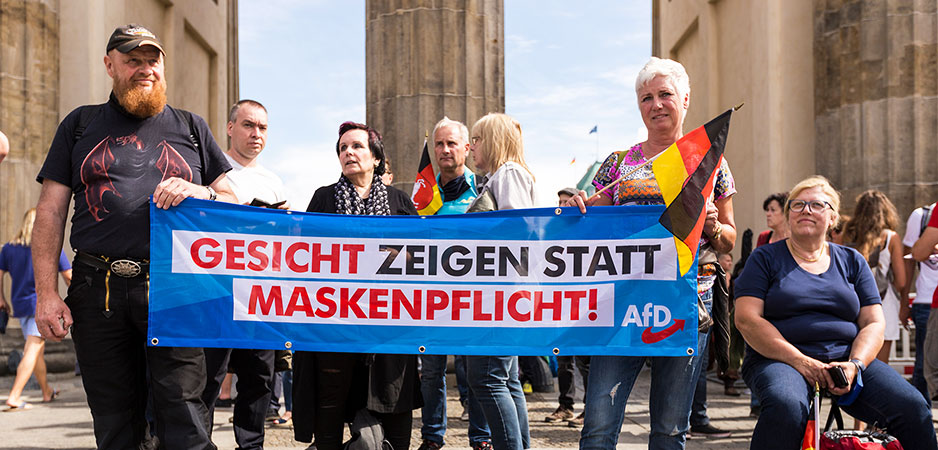If not for the familiar awkwardness of social distancing rules, the scene at the digital party conference of Germany’s Christian Democratic Union (CDU) would have been fit for a daytime game show. With the theme from “Who Wants to Be a Millionaire” playing in the background and the CDU‘s secretary-general, Paul Ziemiak, reading the results from online balloting to determine who would become the party chairman… and drive off in a brand new Volkswagen. Armin Laschet, the premier of North Rhine-Westphalia, and Friedrich Merz, a former CDU parliamentary leader, stood at one end of the TV studio. If not for coronavirus guidelines, they would have probably been holding hands, saying: I hope it’s me who wins, but I’m honored just to stand here with you.
Beware! Populism Might be Bad for Your Health
With 521 of the 991 votes, Laschet was named the new CDU leader on January 16. Although the exaggerated melodrama may invite some mockery and agonized groans from readers, the designation of the new CDU leader is the first key party event before the federal elections in September, which will be pivotal for Germany’s far right.
Angela Merkel‘s long tenure as German chancellor will draw to a close this year. After leading the country through the 2008 financial crash and the 2015 refugee crisis, Merkel will likely leave office just as Germany vaccinates most of its adult population. Germany’s handling of the COVID-19 pandemic has elevated the popularity of Merkel. Similarly, polling suggests the CDU has benefited from the government’s efforts. Whereas the party polled as low as 19% (25% with its Bavarian sister party, the Christian Social Union) in 2019, it now has upward of 30% (and as much as 37% with the CSU) of support.
Germany’s Far Right
At the same time, the far-right Alternative for Germany (AfD) is failing to keep up. Unlike countries such as the United States where COVID-19 skeptics and conspiracy theorists have coalesced on one side of the political spectrum, in Germany, these critics have merged into broad and unexpected coalitions over the course of the crisis. Yet crucially, these coalitions have not resulted in a dealignment or realignment of party loyalties. Rather, they are short term and held together only by grievances about coronavirus restrictions. Consequently, the AfD has not gained sufficient support from these mobilizations and has slipped a couple of percentage points — from its 2017 result of 12.6% to support hovering at around 11%.
Given developments within the AfD over the last two years, its political stagnation is not surprising. In late 2019, a court in the eastern state of Thuringia ruled that it is not defamatory to call the AfD politician Bjorn Hocke a “fascist” as that — as was argued before the court — seems an accurate description of his politics. Further self-inflicted damage followed when the party’s leader in Brandenburg, Andreas Kalbitz, was expelled in May 2020 for previous membership in an extremist youth organization called the Heimattreue Deutsche Jugend. The party’s somewhat formalized far-right wing (Der Flugel) was classified as extremist by the Federal Office for the Protection of the Constitution (BfV). The BfV recently moved to expand its investigation, categorizing the entire AfD as a “suspected case” of anti-constitutional activity. This designation permits close observation and monitoring of party members’ activities.
AfD Would Lose Seats
All these developments, combined with an attempt by far-right extremists to invade the Bundestag, the lower house of parliament, have stunted the AfD‘s growth. The party entered the Bundestag in 2017 as the third-largest faction. Subsequent polling even reported its support surged to 18% in 2018. Yet if the election were held today, the party would likely lose at least a dozen seats.
The question of Angela Merkel‘s successor as chancellor is not yet decided. Laschet is in poll position, but the CDU must perform well in regional elections in Baden-Wurttemberg and Rhineland-Palatinate in order to repel an internal challenge from Markus Soder, the minister-president of Bavaria and leader of the CSU.
Yet regardless of that outcome, the 2021 elections look set to knock the AfD and Germany’s far right back on its heels. There is no chance of banishing it from the Bundestag, but the federal election in September could deprive the AfD of its position as the largest party of the opposition, from where its representatives’ language has been intentionally provocative and their behavior notoriously disruptive.
*[Fair Observer is a media partner of the Centre for Analysis of the Radical Right.]
The views expressed in this article are the author’s own and do not necessarily reflect Fair Observer’s editorial policy.
Support Fair Observer
We rely on your support for our independence, diversity and quality.
For more than 10 years, Fair Observer has been free, fair and independent. No billionaire owns us, no advertisers control us. We are a reader-supported nonprofit. Unlike many other publications, we keep our content free for readers regardless of where they live or whether they can afford to pay. We have no paywalls and no ads.
In the post-truth era of fake news, echo chambers and filter bubbles, we publish a plurality of perspectives from around the world. Anyone can publish with us, but everyone goes through a rigorous editorial process. So, you get fact-checked, well-reasoned content instead of noise.
We publish 2,500+ voices from 90+ countries. We also conduct education and training programs
on subjects ranging from digital media and journalism to writing and critical thinking. This
doesn’t come cheap. Servers, editors, trainers and web developers cost
money.
Please consider supporting us on a regular basis as a recurring donor or a
sustaining member.
Will you support FO’s journalism?
We rely on your support for our independence, diversity and quality.






